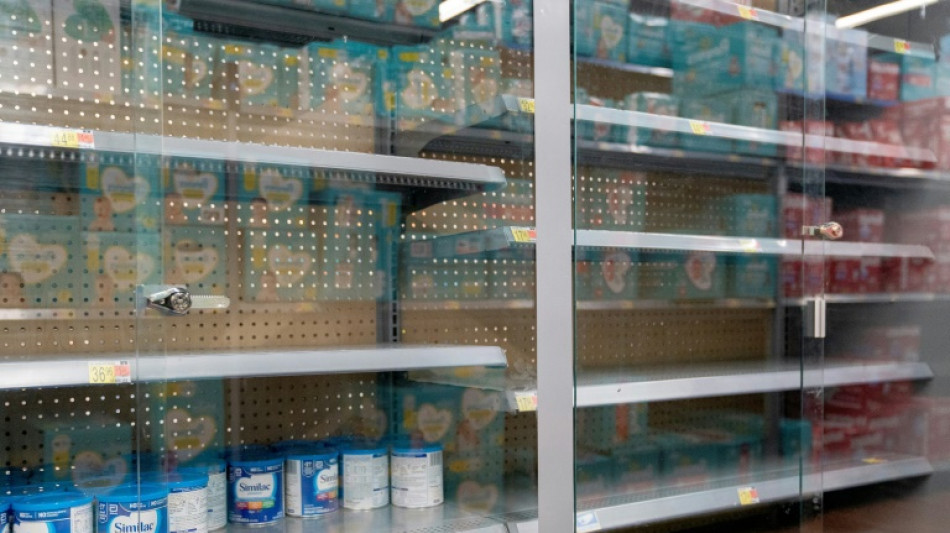
SCS
-0.2000

It's a nightmare for parents. The United States is in the grip of a severe shortage of baby formula -- with a mass product recall aggravating pandemic supply chain woes -- sending families on sometimes desperate hunts for the vital supplies.
And it has been going on for months, according to Sara Khan, the mother of three children aged 10, seven and six months.
"I've known about this issue for almost seven months," she told AFP. "This did not happen overnight."
Khan described the struggle to find just a few bottles of formula, and the distress at being faced with empty shelves at pharmacy chains CVS and Walgreens or supermarket Target, whether in Washington or the surrounding area.
She has gotten by thanks to family and friends, who send her bottles of formula from Boston, New York and Baltimore when they find them.
"It's horrible, terrifying," she said, adding that she even ordered formula from Germany.
The situation took a major turn for the worse on February 17 when, after the death of two infants, manufacturer Abbott announced a "voluntary recall" for formula made at its factory in Michigan -- including Similac, a brand used by millions of American families.
A subsequent investigation cleared the formula, but production has yet to resume, exacerbating already ongoing scarcity caused by supply chain problems and labor shortages.
According to the data collection agency Datasembly, 43 percent of the usual formula supply was out of stock, up 10 percent from the April average.
- Few alternatives -
San Diego, California resident Olivia Espinosa said: "There's nothing on the shelves."
Espinosa and her husband Steve Hohman have two young children. One of them, Maya, is only three weeks old and is lactose intolerant.
"We have to go just with a plant-based formula because we can't try anything else," said Hohman.
Normally, hospitals and pediatricians give parents formula samples to figure out which one works best for their child.
But few have any left to give.
Hohman said it was frustrating that his daughter cannot try other formulas that might be more nutritious for her.
Espinosa said the shortage has been "extremely frustrating and especially with a newborn, somebody who is requiring... very specific food right now."
She explained she has difficulty breastfeeding and producing enough milk.
According to Khan, it is difficult even for babies who do not have special food needs.
- Surging costs -
People have suggested she try other brands, but "that's not how it works," Khan said. The formula has to taste good and not cause any problems such as constipation to the individual children.
And in addition to supply issues, parents are struggling to keep up with costs, as online sellers have doubled or even tripled their prices.
Robert Califf, head of the US Food and Drug Administration (FDA), highlighted the problem in a statement released Tuesday evening.
"We recognize that many consumers have been unable to access infant formula and critical medical foods they are accustomed to using," he said. "We are doing everything in our power to ensure there is adequate product available where and when they need it."
On Wednesday, Abbott said it "deeply" regrets the situation.
"Since the recall, we've been working to increase supply at our other FDA-registered facilities, including bringing in Similac from our site in Cootehill, Ireland, by air and producing more liquid Similac and Alimentum," the group said in a statement.
And the shortage has been politicized, too.
"I called for action on (President Joe) Biden's baby formula shortage months ago," Republican congresswoman Elise Stefanik charged on Twitter.
Her extreme-right colleague Marjorie Taylor Greene accused the US Congress of wanting "to send nearly $40 billion to Ukraine while American mothers can't find baby formula."
But White House Spokeswoman Jen Psaki said Monday on CNN that the Biden administration is "working around the clock" to address the shortage.
B.Krishnan--DT